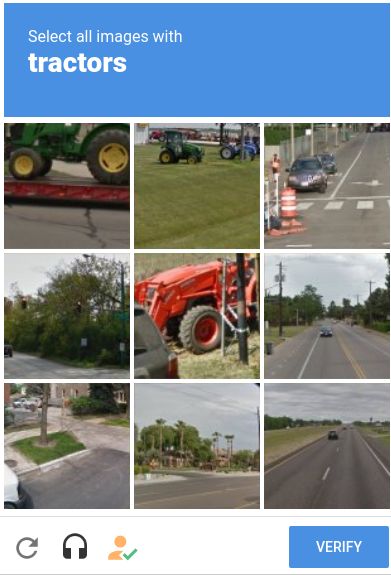There are few things I despise more than Google’s reCAPTCHAs. I encounter them at least numerous times each week. Some are easy to solve, but annoying. Others are more difficult to solve, and thus more annoying. Lately, I have been receiving reCAPTCHAs asking me to click on all images containing trucks. Every image contains a blurry image of a truck, a bus, or a boat. I solve them correctly, but it is not always easy.

There have been allegations that Google makes reCAPTCHAs more difficult for people using browsers other than Google Chrome. Is it true? I have not used Chrome in about seven years. But from that vantage point – I can believe the allegations.
Having a visceral hatred of Google’s CAPTCHAs, I was interested to click on an article titled Why CAPTCHA Pictures Are So Unbearably Depressing. I usually attack CAPTCHAs for being annoying, but this article, published by Mr. Clive Thompson on August 5, 2021, takes a different track:
CAPTCHA images are never joyful vistas of human activity, full of Whitmanesque vigor. No, they’re blurry, anonymous landscapes that possess a positively Soviet anomie.
In other words, CAPTCHA images are unaesthetic. Moreover, they are actively unaesthetic, and depressing in their contents. This is a strong description by Mr. Thompson. Once you think of CAPTCHAs as being Soviet, you cannot think of them as anything else.
Mr. Thompson goes on to list six reasons why CAPTCHA images are depressing. Rather than recount all of those images here, I will suggest that you read Mr. Thompson’s essay for yourself. However, I will discuss his fifth reason in brief here: “The grids on the photos are an alien’s-eye view of the world.” Here, Mr. Thompson is referring to those dreadful CAPTCHAs that break a single photo into sixteen equally sized squares and then direct the user to select all of the squares containing a specific thing. Mr. Thompson writes:
By asking us to identify elements of an image that are sliced into pieces … CAPTCHAs turn everyday reality into a puzzle that no normal human would ever think of as a puzzle. This is what’s so disquieting about that exercise. We’re being asked to parse the world in the visual-scanning style of an AI. Which, in turn, makes you feel like an AI, hunting for meaning in a baffling world.
This is a keen insight. CAPTCHAs force humans to do the work of machines. In order to solve CAPTCHAs, humans must look at the world through the grainy camera of a machine and attempt to solve puzzles that only puzzle machines. I have written critically about the tendency of big tech giants and businesses to treat human beings as products. Mr. Thompson highlights another troubling trend – treating humans on the internet like machines. In the case of Google’s reCAPTCHAs, Mr. Thompson noted aptly: “The problem with CAPTCHAS … is that we’re forced to look at these images, by a $1.8 trillion firm.”
I do not purport to solve the reCAPTCHA problem, to opine on its technical merits and demerits, or to propose specific solutions. Here, I note only that reCAPTCHAs are annoying, and as Mr. Thompson says generally in other words, are anti-human. While it is possible to find alternatives to entities that treat humans as commodities, it is harder to find alternatives to this one thing that treats humans as machines.
At the very least, perhaps decentralizing CAPTCHAs is in order.
(Aside: This complaining about reCAPTCHAs made me search for a solution in earnest. I am trying one now. If it works well for me, I may write about it at The New Leaf Journal in the future.)
Update: Reader Comment and Response
I received a comment via email on this article from Merle Hall. The comment had been intended for the Guestbook, but as it notified me, our Guestbook did not work (see article on closing the Guestbook). Because the comment cannot be published in that which does not exist, I will publish it along with my response below. Note that the comment is mildly edited only to remove the portion dealing with the functionality issue in our former Guestbook.
Comment from Merle Hall
I suggest looking into reCAPTCHA v3 (link) which requires no human intervention. Very nice from that perspective. No clue what info Google is collecting, if anything, through its use.
Merle Hall from GRANGER
My Response
I think that I have heard of reCAPTCHA v3. Anything that does not involve those terrible pictures is certainly an improvement. If we must have CAPTCHAs, at least let them be CAPTCHAs that do not torture people.
I have concerns about Google’s centralization in general. But to the extent that it is unavoidable, let it be less anooying and burdensome for human beings who want to visit a website for legitimate purposes.
From the perspective of the administrator of a small website, website admins should consider what type of protection they really need. For example, I was able to mitigate spam in the former Guestbook and generally prevent it with our contact form without relying on third party services. This is obviously not possible in every case, but that is precisely why web admins should consider their needs before resorting to potentially irritating (or soul-crushing) solutions unnecessarily.